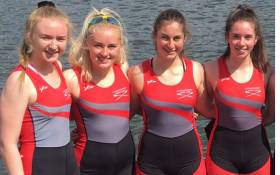Displaying items by tag: Methodist College
Carlow and Castleconnell Notch Up Wins at Ghent
#Rowing: Carlow’s Sadhbh Scully and Keara Egan won the junior 18 women’s double at Ghent regatta on Sunday – first of 18 competing crews. Castleconnell won the women’s junior 18 quadruple, another competitive event, with 10 crews completing the course. Both clubs did well over the two days, as did Three Castles, Methodist College, Belfast, Cork and Commercial, whose senior men’s eight took second on the Sunday.
Ghent Spring Regatta, Belgium (Selected Results; Irish interest):
Saturday
Men
Sculling, Quadruple: 3 Lagan Scullers. Junior: 5 Three Castles.
Double – Jun: 3 Three Castles (L Flynn, A Keogh)
Single – Jun: 5 Cork (P Beechinor) 7:41.32.
Women
Eight – Junior: 1 Commercial 7:25.17.
Four – Jun: 1 Castleconnell 7:32.0, 2 Commercial 7:37.27.
Pair - Senior: 2 Anna Liffey (C Dempsey, D Maguire). Under-23: Cork (J Duggan, C O’Sullivan) 8:11.24. Junior: 1 Cork (J Duggan, C O’Sullivan) 7:59.94, 2 Castleconnell (L O’Brien, N Kiely) 8:04.33.
Sculling
Double – Junior: 5 Carlow.
Lightweight Single: 2 Skibbereen (O Hayes). Under-23: 1 Carlow (K Egan) 8:49.25. Junior: 6 Carlow (S Scully).
Sunday
Men
Eight – Senior: 2 Commercial. Four, coxed- Jun 18: 2 Methodist College, Belfast. Junior 16: 2 Castleconnell.
Sculling, Quadruple: 2 Three Castles.
Double – Jun 18: 4 Cork (Beechinor, M Cronin) 7:08.14.
Single – Under-23 Lightweight: 2 Castleconnell (B Frohburg). Jun 18: 3 Three Castles (Flynn), 5 Three Castles (Tiarnan McKnight), 6 Three Castles (Keogh).
Women
Four – Jun: 1 Commercial 7:41.73, 2 Castleconnell.
Pair – Sen: 3 Anna Liffey (Dempsey, Maguire). Under-23: Cork (Duggan, O’Sullivan) 8:47.59. Jun: Cork (Duggan, O’Sullivan) 8:12.36, 3 Commercial.
Sculling, Quadruple – Jun 18: 1 Castleconnell 7:21.72. Jun 16: 3 Castleconnell, 4 Carlow.
Double – Jun 18: 1 Carlow (Scully, Egan) 7:58.26.
Single – Lightweight: 2 Skibbereen (Hayes). Lwt U-23: 1 Carlow (Egan) 8:56.71. Jun 18: 3 Carlow (Scully); 5 Cork (H Gahan).
Colaiste Iognaid Edged Out by Methody at Irish Schools' Regatta
#Rowing: Portadown Regatta enjoyed almost perfect conditions today. A packed programme was run in bright, warm sunshine and on flat water. RBAI beat the host club in one of the top events of the day, the men’s junior 18 eights final, reversing the decision of last year.
Shauna Murtagh of Carrick-on-Shannon beat Kate Crawford of Portadown in the women’s junior 18 single sculls – a first win in a regatta for the 16-year-old daughter of Ireland great Frances Cryan.
The men’s junior 18 single was won by Hugh Moore of Coleraine Grammar School.
























































